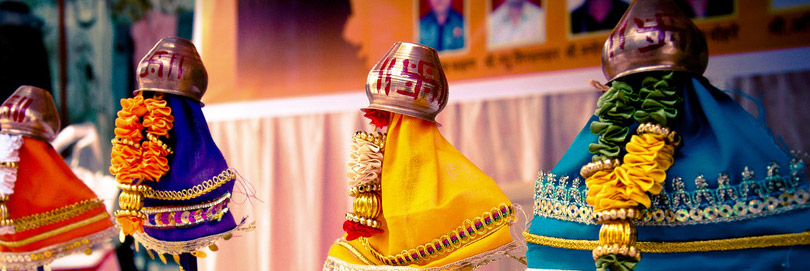Gudi Padava

The word Padwa is etymologically quite close to the Sanskrit word for crop which is Pradurbhu. Padava might be a corrupted form of the original word for "crop" which was used to term the new year festival. The term 'padwa' or 'padavo' is also associated with Diwali, another New Year celebration that comes at the end of the harvesting season, thus substantiating the agricultural link to the festival.
On the festive day, courtyards in village houses will be swept clean and plastered with fresh cow dung. Even in the city, people take the time out to do some cleaning. Women and children work on intricate rangoli designs on their doorsteps, the vibrant colors mirroring the burst of color associated with spring. Everyone dresses up in new clothes and it is a time for family gatherings.
For Farmers, this is a festival marking the end of one Harvest and the beginning of another, was a festival heralding the beginning of a New Year. Gudi Padava is also looked upon as a new year in some parts of India such as Maharashtra, Karnataka, Andhra occurs in the month of Chaitra ( March-April).
FIRST DAY:
Dhanatrayodashi | Yamadeepdaan | Dhan Teyras | Asweyuja Bahula Thrayodasi / Dhantheran
SECOND DAY:
Choti Diwali | Narkachaturdashi | Roop Chaturdashi | Kali Choudas | Mahanisha / Kali Puja | Divvela Panduga / Divili Panduga
THIRD DAY:
Laxmi Pujan | Chopda Pujan | Deva Divali | Sukhsuptika | Kaumudi Mahostavam | Badhausar | Balindra Pooja | Karthigai Deepam | Thalai Deepavali | Sharda Pujan | Bandi Chhor Diwas | Diyari
FORTH DAY:
Goverdhan puja | Bestavarsh | Gudi Padava | Varsha Pratipada/ Pratipad Padwa | Annakoot | Bali Padyam / Bali Pratipada | Muharat Pujan
FIFTH DAY:
Bhai Phota | Bhaubeej / Bhav-Bij | Bhai-Tika | Yamadwitheya / Bhathru Dwithiya | Gorehabba | Bhatri Ditya | Bhathru Dwithiya
RELATED FESTIVALS:
Kojagara | Labh Pancham | Tulsi Vivah
- - Diwali Cards
- - Crackers
- - Dry Fruits
Festival Fun
- Diwali Rangoli
- Diwali Whatsapp Messages/Status
- Diwali Recipes
- Deep in Diwali
- Tradition of Playing Cards
- Pooja Thali Decorations
- Making Diwali Cards
- Diwali Essay
- Diwali Poems
- Diwali Songs
- Diwali Mela
- Diwali Wallpapers
- Diwali Decorative Items
- Diwali 2024
- Diwali Messages
- Diwali Quotes
- Lakshmi Pooja
- Articles
- Lakshmi Ganesha Mantras
- Lakshmi Chalisa
- Diwali SMS
- Diwali Solar Eclipse
- Diwali Remedies
- 108 Lakshmi Names
Diwali Rangoli
Indians love colors and its perfectly reflected in various ways. Rangoli is one such example that is a unique art work that is...Know More
Diwali in History
The history of Diwali is replete with legends and these legends are moored to the stories of Hindu religious scriptures...Know More
Diwali Messages
Enjoy the Best and the Most Heartfelt Diwali Messages from all entries received by us!!...Know More
Diwali Gift Ideas
Diwali is the epiphany of showing gratefulness to the almighty for blessing with wealth and wisdom. It is the time of illuminating...Know More





